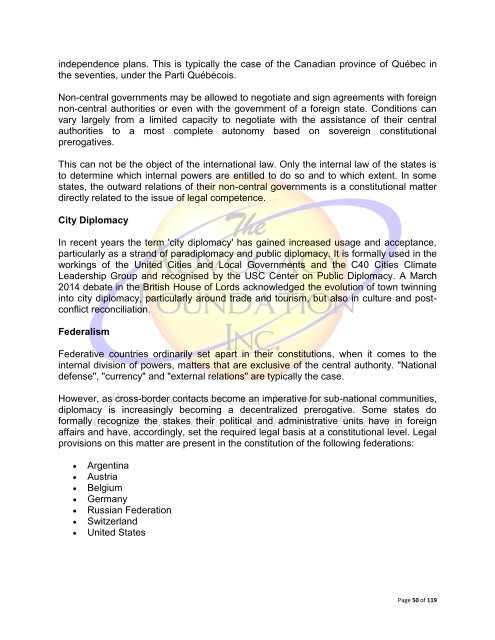International Legal Evangelism: Intelligence, Reconnaissance & Missions
International Legal Evangelism: Intelligence, Reconnaissance & Missions
International Legal Evangelism: Intelligence, Reconnaissance & Missions
Create successful ePaper yourself
Turn your PDF publications into a flip-book with our unique Google optimized e-Paper software.
independence plans. This is typically the case of the Canadian province of Québec in<br />
the seventies, under the Parti Québécois.<br />
Non-central governments may be allowed to negotiate and sign agreements with foreign<br />
non-central authorities or even with the government of a foreign state. Conditions can<br />
vary largely from a limited capacity to negotiate with the assistance of their central<br />
authorities to a most complete autonomy based on sovereign constitutional<br />
prerogatives.<br />
This can not be the object of the international law. Only the internal law of the states is<br />
to determine which internal powers are entitled to do so and to which extent. In some<br />
states, the outward relations of their non-central governments is a constitutional matter<br />
directly related to the issue of legal competence.<br />
City Diplomacy<br />
In recent years the term 'city diplomacy' has gained increased usage and acceptance,<br />
particularly as a strand of paradiplomacy and public diplomacy. It is formally used in the<br />
workings of the United Cities and Local Governments and the C40 Cities Climate<br />
Leadership Group and recognised by the USC Center on Public Diplomacy. A March<br />
2014 debate in the British House of Lords acknowledged the evolution of town twinning<br />
into city diplomacy, particularly around trade and tourism, but also in culture and postconflict<br />
reconciliation.<br />
Federalism<br />
Federative countries ordinarily set apart in their constitutions, when it comes to the<br />
internal division of powers, matters that are exclusive of the central authority. "National<br />
defense", "currency" and "external relations" are typically the case.<br />
However, as cross-border contacts become an imperative for sub-national communities,<br />
diplomacy is increasingly becoming a decentralized prerogative. Some states do<br />
formally recognize the stakes their political and administrative units have in foreign<br />
affairs and have, accordingly, set the required legal basis at a constitutional level. <strong>Legal</strong><br />
provisions on this matter are present in the constitution of the following federations:<br />
<br />
<br />
<br />
<br />
<br />
<br />
<br />
Argentina<br />
Austria<br />
Belgium<br />
Germany<br />
Russian Federation<br />
Switzerland<br />
United States<br />
Page 50 of 119

















